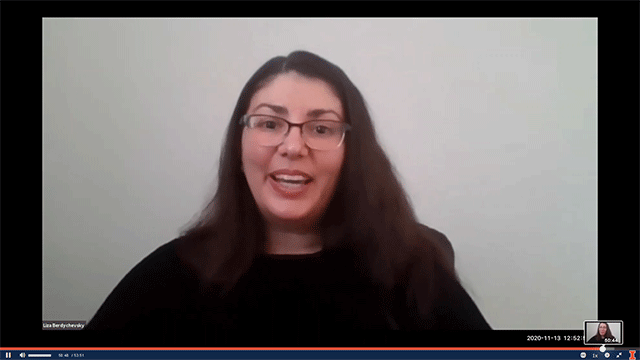
Lecture Series Highlights Research, Services
AHS E-News Winter 2020

From November 6 through November 20, alumni were given five opportunities to learn more about the research and services of various college units through virtual presentations by AHS faculty and staff. The AHS Fall Lecture Series was the brainchild of the college’s Office of Advancement, and featured such topics as auditory exposure and brain development in pre- and full-term infants and sexuality in later life.
“The AHS Lecture Series was a terrific opportunity to highlight a few examples of the remarkable research, teaching, and services in the College of Applied Health Sciences,” said Jean Driscoll, assistant dean for advancement. “The work of our faculty, staff, and students is relevant, important, and very interesting.”
The series opened with a presentation by staff members of the Division of Disability Resources and Educational Services (DRES), who discussed how the coronavirus pandemic was impacting both the services provided by DRES and the students receiving services. Since 2014, the number of students registered with DRES has increased more than 70 percent, with nearly three-quarters of registrants having non-visible disabilities, including learning disorders and mental health disabilities. Access specialist Amanda Carey said online learning has impacted DRES students both positively and negatively. “Some of my students are really struggling with not being able just to stay after class to ask professors a question; they’re missing that interaction,” she said. “For some students with mental health disabilities who might struggle with attendance on campus, asynchronous learning has enabled them to learn on their schedule, and they’re reporting their best attendance ever.”
In the second presentation of the series, Speech and Hearing Science professor Brian Monson and clinical professor Sadie Braun talked about their collaboration on a study of auditory exposure and brain development in preterm infants. In utero, fetuses start to hear sounds from the outside environment around the onset of the third trimester of pregnancy. Full-term newborns demonstrate auditory memory, behavioral or neurophysiological responses that show they gain a lot of information in the womb, including being able to recognize the mother’s voice and native language, as well as frequently heard melodies and stories. What happens to infants born prematurely, who are deprived of that rich auditory experience in the sterile environment of a neonatal intensive care unit? What impact does it have on their developing brains? Drs. Monson and Braun hope to answer these and other questions through their research.
Also representing the Department of Speech and Hearing Science were Dr. Keiko Ishikawa and clinical assistant professor Clarion Mendes, who discussed how they prepared speech-language pathology graduate students to work with clients through telepractice. See related story about telepractice here.
“We don’t stop playing because we grow old; we grow old because we stop playing.” This perspective, along with an increased understanding of sex as leisure, emerges strongly from one of the current research lines of Recreation, Sport and Tourism professor Liza Berdychevsky, who is examining the role of positive sexuality in later life. In the third presentation of the Fall Lecture Series, Dr. Berdychevsky noted that stereotypes of older adults has made studies of their sexuality rare. She has examined sex-related discussions in online communities for older adults, sex as leisure in later life, and the importance of sexual health education in later life. Among her findings: older adults view online sex-related discussions as fun, informative, and liberating; sex is often discussed by older adults as an enjoyable, gratifying, and stress-relieving leisure activity; and framing sex as leisure in sexual health education for older adults may help to normalize and legitimize sex for older adults and improve communication about sex.
The fourth event of the series, presented by the Chez Veterans Center, focused on veterans in the civilian labor market. See related story about the Veterans Day event here.
Dr. Wendy Rogers of the Department of Kinesiology and Community Health wrapped up the series with an overview of her work in the area of healthy aging and technology. She is the director of the Collaborations in Health, Aging, Research, and Technology, or CHART, an interdisciplinary research theme in the College of Applied Health Sciences that involves faculty across campus, community members, and health care providers. She also directs the McKechnie Family LIFE Home, the Health Technology Education Program, and the Human Factors and Aging Lab, where research focuses on understanding the abilities, limitations, needs, and preferences of older adults that impact the design of technologies that are both usable and useful. Among the current projects is the design and testing of a Medication Education, Decision Support, Reminding, and Monitoring (MEDSReM) self-management system that supports hypertension medication adherence and blood pressure (BP) management for non-adherent older adults. The lab also focuses heavily on the design of robots to support successful aging.
